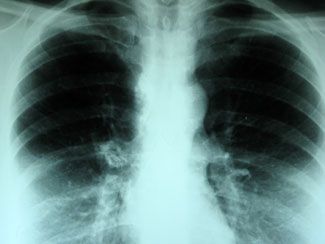Multikinase Inhibitor Motesanib Misses PFS Endpoint in NSCLC Trial
The oral multikinase inhibitor motesanib failed to meet the primary endpoint of improving progression-free survival (PFS) in patients with non–small cell lung cancer (NSCLC) in the phase III MONET-A trial.
The oral multikinase inhibitor motesanib failed to meet the primary endpoint of improving progression-free survival (PFS) in patients with non–small cell lung cancer (NSCLC) in the phase III MONET-A trial, according to Takeda, the company developing the drug.

The oral multikinase inhibitor motesanib failed to meet the primary endpoint of improving progression-free survival (PFS) in patients with nonsmall cell lung cancer (NSCLC) in the phase III MONET-A trial, according to Takeda, the company developing the drug.
In its statement, Takeda reported the company is “working with trial investigators to ensure patients who participated in the study will receive appropriate therapies.”
The phase III MONET-A trial randomized 401 patients with stage IV or recurrent nonsquamous NSCLC in a 1:1 ratio to paclitaxel and carboplatin plus either placebo or motesanib, which inhibits VEGFR1, -2, and -3, PDGFR, and Kit. Patients had not received previous systemic therapy for advanced disease.
The study was launched among Asian patients in Japan, South Korea, Taiwan, and Hong Kong, following previously reported results from the phase III MONET1 study. MONET1 had the same two study arms as MONET-A, but included patients who were white, Asian, Hispanic, or Black.
MONET1 missed its primary endpoint of improved overall survival (OS); however, the study results revealed “significant and consistent findings” among Asian patients for OS, PFS, and ORR, according to Takeda, forming the rationale for MONET-A.
Beyond the primary PFS endpoint, secondary endpoints in MONET-A included OS, objective response rate (ORR), duration of response, and safety.
The full study results will be reported when they become available, according to Takeda.
Results from the MONET1 study were published in theJournal of Clinical Oncologyin 2012. The trial randomized 1090 patients with advanced, nonsquamous NSCLC in a 1:1 ratio to carboplatin (AUC, 6 mg/mL/min) and paclitaxel (200 mg/m2) intravenously for up to six 3-week cycles plus once-daily oral motesanib (125 mg; n = 541) or placebo (n = 549).
Patients had an ECOG PS of 0 or 1 and had not previously received systemic therapy for advanced disease. The median patient age in both arms was 60 years. The percentage of patients with adenocarcinoma in the treatment and control arms was 83% and 81%, respectively. According to the racial demographics, the trial included 715 White patients, 287 Asian patients, 66 Hispanic patients, 16 Black patients, and 6 listed as “other.”
OS was the primary endpoint, with secondary endpoints including PFS, ORR, and safety.
The median OS in the motesanib and placebo arms was 13.0 and 11.0 months, respectively (HR = 0.90; 95% CI, 0.78-1.04;P= .14). Among patients with adenocarcinoma, the median OS was 13.5 versus 11.0 months, respectively (HR = 0.88; 95% CI, 0.75-1.03;P= .11).
Among nonwhite patients (n = 375), subgroup analyses indicated longer survival in the motesanib arm (HR =0.76; 95% CI, 0.59-0.97). Asian patients were the only subset who had significantly improved OS with motesanib.
The median PFS among all patients with nonsquamous histology was 5.6 months with motesanib, compared with 5.4 months in the control arm (HR = 0.79; 95% CI, 0.68-0.90;P= <.001). In the adenocarcinoma subgroup, the PFS was also 5.6 versus 5.4 months (HR = 0.78; 95% CI, 0.67-0.91;P= .0016).
ORR for all patients with nonsquamous histology was 40% and 26% in the treatment and control arms, respectively. In the adenocarcinoma subset, ORR was 39% and 25%, respectively.
Grade ≥3 adverse events (AEs) occurred in 73% of patients in the motesanib arm and 59% of patients in the placebo arm. The grade ≥3 AEs with the highest incidence in the motesanib group included neutropenia (5% vs 2% in the placebo arm), diarrhea (5 vs <1%), febrile neutropenia (4% vs 3%), pneumonia(4% vs 1%), and thrombocytopenia (3% vs 1%).
Grade 5 AEs occurred in 14% and 9% of the two arms, respectively.
Takeda acquired exclusive rights to develop and commercialize motesanib from Amgen in June 2012.
Reference
Scagliotti GV, Vynnychenko I, Park K, et al. International, randomized, placebo-controlled, double-blind phase III study of motesanib plus carboplatin/paclitaxel in patients with advanced nonsquamous non-small-cell lung cancer: MONET1.J Clin Oncol